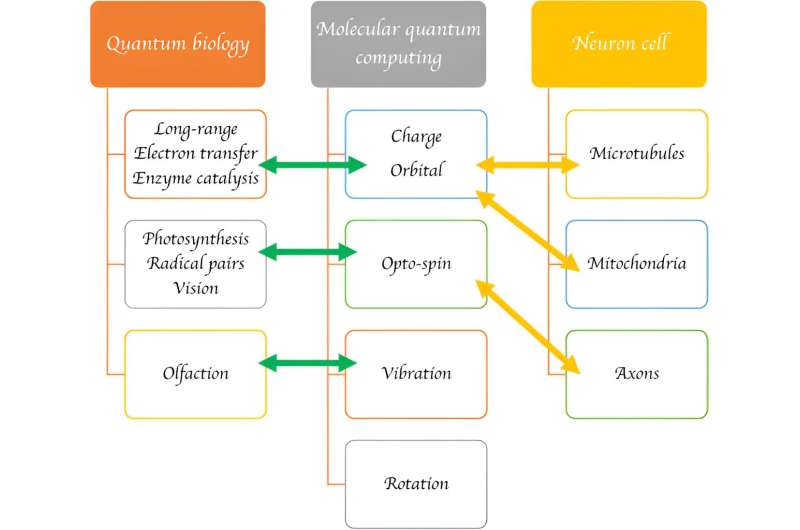This article has been reviewed according to Science X's editorial process and policies. Editors have highlighted the following attributes while ensuring the content's credibility:
fact-checked
trusted source
proofread
New research area promotes both quantum computing and cognitive science

Diving deep into quantum biology or cognitive science alone is challenging enough. That being said, a research team recently wrote a review article highlighting molecular quantum computing, a newly emerged research area that is likely to push the research boundaries of both. The review was published in Intelligent Computing.
Future theoretical breakthroughs may be achieved by connecting molecular quantum computing, the bridge research area, with cognitive science and quantum biology, the authors argue.
Cognitive science centers on exploring the learning mechanism, including whether neurons learn at the classical or quantum level. Quantum biology, on the other hand, seeks to address the biological questions that cannot be answered by classical mechanics alone. These puzzles may be solved through molecular quantum computing, which uses the special functions of molecules to process quantum information.
The review first covers the progress in molecular quantum computing, quantum biology, and cognitive science in general, then explains some basic terms in quantum physics before narrowing down to several key concepts to connect the dots.
One of the key concepts is quantum degrees of freedom, the bedrock of understanding and simulating quantum effects in biological systems. To simplify, quantum degrees of freedom generally describe how much "freedom" a qubit—the quantum equivalent of a classical bit—is allowed in storing and processing information in a given space.
Specifically, quantum degrees of freedom include orbitals, charges, spins, vibrations, rotations, photonic states, etc., and researchers could create different combinations of these to give different features to a quantum computing system.
In molecular quantum computing, the manipulation of molecular degrees of freedom, such as charge movement and spin states, is crucial for creating and maintaining quantum coherence. This coherence is a high-maintenance feature essential for the high performance of a quantum computing system, enabling electrons to function as qubits and transfer information across quantum circuits.
In quantum biology and cognitive science, degrees of freedom are also important. A single protein in a neuron is complicated enough to allow multiple degrees of freedom to create the quantum effect, which has already been observed in some biological processes like enzyme catalysis and photosynthesis and which may account for consciousness.
The quantum properties in enzyme catalysis are related to charge and orbital degrees of freedom, which could be used in performing molecular quantum computing and are presumed to be associated with microtubules and mitochondria—two key components inside a neuron cell.
In photosynthesis, the quantum effect largely involves opto-spins, an interplay between photon and spin. Opto-spins could provide insights into molecular quantum computing, where qubit performance could be enhanced by applying light to magnetic spins, and into cognitive science, where axons, another key component of neurons, might use bio-photons and spins to process information.
While many of the suggested connections remain unconfirmed or understudied, the research team hopes that further exploration could lead to "an extremely exciting science" appearing at the intersection of molecular quantum computing, quantum biology and cognitive science.
More information: Wei Wu et al, Can Molecular Quantum Computing Bridge Quantum Biology and Cognitive Science?, Intelligent Computing (2024). DOI: 10.34133/icomputing.0072
Provided by Intelligent Computing





















